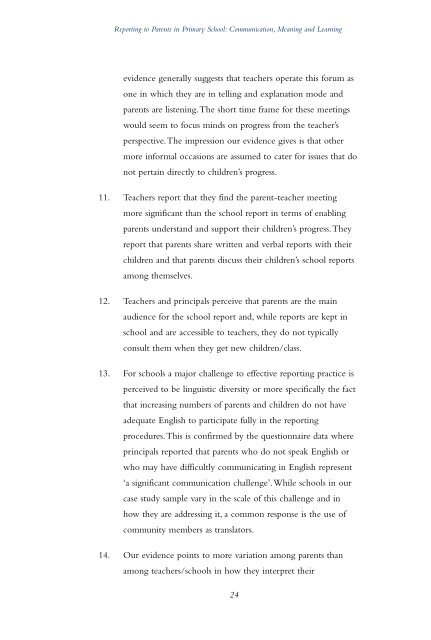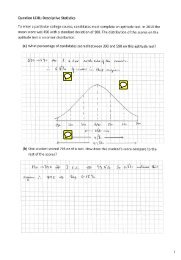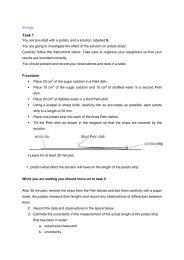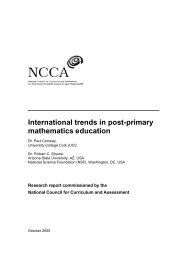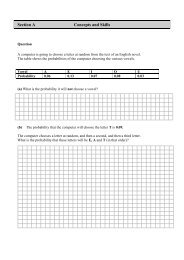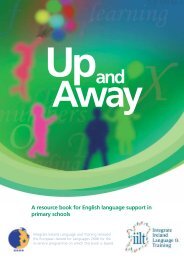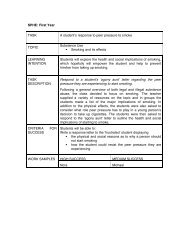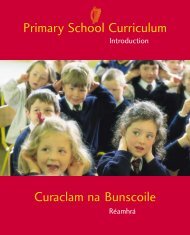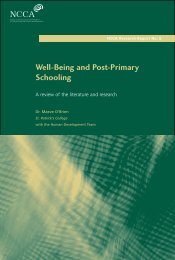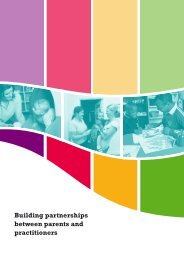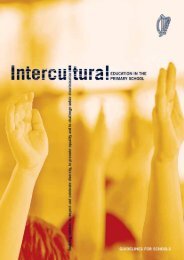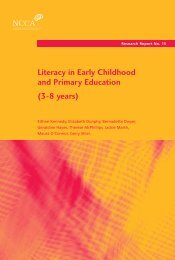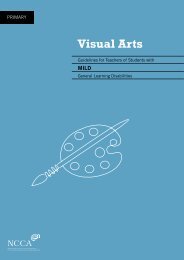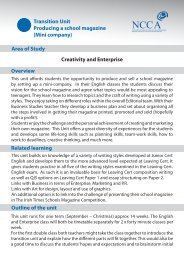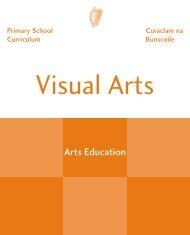Reporting to Parents in Primary School: Communication, Meaning ...
Reporting to Parents in Primary School: Communication, Meaning ...
Reporting to Parents in Primary School: Communication, Meaning ...
You also want an ePaper? Increase the reach of your titles
YUMPU automatically turns print PDFs into web optimized ePapers that Google loves.
<strong>Report<strong>in</strong>g</strong> <strong>to</strong> <strong>Parents</strong> <strong>in</strong> <strong>Primary</strong> <strong>School</strong>: <strong>Communication</strong>, Mean<strong>in</strong>g and Learn<strong>in</strong>g<br />
evidence generally suggests that teachers operate this forum as<br />
one <strong>in</strong> which they are <strong>in</strong> tell<strong>in</strong>g and explanation mode and<br />
parents are listen<strong>in</strong>g. The short time frame for these meet<strong>in</strong>gs<br />
would seem <strong>to</strong> focus m<strong>in</strong>ds on progress from the teacher’s<br />
perspective. The impression our evidence gives is that other<br />
more <strong>in</strong>formal occasions are assumed <strong>to</strong> cater for issues that do<br />
not perta<strong>in</strong> directly <strong>to</strong> children’s progress.<br />
11. Teachers report that they f<strong>in</strong>d the parent-teacher meet<strong>in</strong>g<br />
more significant than the school report <strong>in</strong> terms of enabl<strong>in</strong>g<br />
parents understand and support their children’s progress. They<br />
report that parents share written and verbal reports with their<br />
children and that parents discuss their children’s school reports<br />
among themselves.<br />
12. Teachers and pr<strong>in</strong>cipals perceive that parents are the ma<strong>in</strong><br />
audience for the school report and, while reports are kept <strong>in</strong><br />
school and are accessible <strong>to</strong> teachers, they do not typically<br />
consult them when they get new children/class.<br />
13. For schools a major challenge <strong>to</strong> effective report<strong>in</strong>g practice is<br />
perceived <strong>to</strong> be l<strong>in</strong>guistic diversity or more specifically the fact<br />
that <strong>in</strong>creas<strong>in</strong>g numbers of parents and children do not have<br />
adequate English <strong>to</strong> participate fully <strong>in</strong> the report<strong>in</strong>g<br />
procedures. This is confirmed by the questionnaire data where<br />
pr<strong>in</strong>cipals reported that parents who do not speak English or<br />
who may have difficultly communicat<strong>in</strong>g <strong>in</strong> English represent<br />
‘a significant communication challenge’. While schools <strong>in</strong> our<br />
case study sample vary <strong>in</strong> the scale of this challenge and <strong>in</strong><br />
how they are address<strong>in</strong>g it, a common response is the use of<br />
community members as transla<strong>to</strong>rs.<br />
14. Our evidence po<strong>in</strong>ts <strong>to</strong> more variation among parents than<br />
among teachers/schools <strong>in</strong> how they <strong>in</strong>terpret their<br />
24


